Food Tour of Iowa: Hinegardner's Orchard
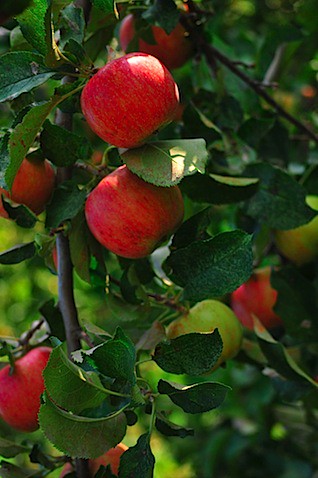
Iowa has a lot of nothing.
Not a particularly profound statement; but one that was reinforced on my drive out to Hinegardner's. It has a corollary though: that same absence makes the items of interest all the more notable.
As I drove out to the Orchard, I passed through rolling cornfields, quaint old country stores and old, Midwestern towns with names like “Tama” and “Toledo”. Because it was a Sunday, the Main Streets were empty; only ghosts seemed to inhabit the towns I passed through. There was one exception: the grandly appointed and architecturally imposing Meskwaki casino, which ironically marked the turn off to the very humble, but far more interesting, orchard.
Hinegardner’s orchard is Hinegardner’s Orchard. That is, it is in the most literal way the orchard of the Hinegardner family.
As soon as I got there, John, the current operator, urged me to “go ahead and hop on” the back of a red 4 wheeler. With that, we were off. The tour was very interactive; I probably ate 5 apples. John had knack for illustrating comments about flavor with a practical and tasty example.
“This is a Johnathan. Good taste; I prefer a JohnnyGold though”. He illustrated his point by pulling one off the branch as we passed under the tree. It was good; probably twice as good because I had just seen it picked off the tree. Crisp and delicious, but more interestingly room temperature. These apples hadn’t been chilling in a refrigerator. The entire trip was like that. As we wound our way through rows of Golden Delicious, Johnathan, Johnny Gold, Honeycrisp apples, as well as some Stark Delicious pears, John would drive under a particularly likely looking limb and urge me to pluck one off and give it a taste; they were all delicious. The tour was part history lesson, part family history, and part agriculture.
Johns grandfather started the Hinegardner estate, as I will call it, with just a horse and a plow in 1937. His mission: to plow out a lake for depression and World War 2 era customers, who were short on money and gas. At the lake, they would be able to get away for a small vacation. Later, he sold his 250 acres in Texas and upgraded to a caterpillar. Now it is a fine lake; large enough to accommodate water-skiers and fisherman who are looking for bass and walleye. While the entire farm was extremely picturesque, the lake was especially so. Nestled in between the rolling hills of Central Iowa, it stretched majestically between two banks filled with Oak trees.
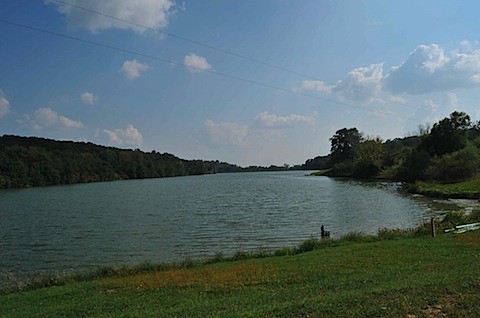
As we bounced our way across the road to the lake from the orchard, John related the pleasures of growing up around the lake, roller-skating, fishing and having all sorts of outdoor fun. Looking around, I saw myself as a little kid; running through the trees, swimming and fishing; I could see myself getting used to it.
The orchard, in comparison to the lake, is a more recent development. It was started in 1967, but didn’t start really producing fruit around 1971. People did then, and still do, come to pick their own bushels of apples and pears, from the different varieties of trees in the Orchard. John keeps about 3,000 trees and has to plant about 100 per year to keep that number steady.
After the first lap around the orchard, while I was still reeling from the profusion of names, facts about apple trees and the giddying adventure of riding on the back of a 4-wheeler (a first for me; might I add. In addition, during the entire adventure I was hanging on with one hand, taking notes with the other and taking pictures with the hand that was supposed to keep me from falling off), we stopped at the cider house, where John makes cider with the extra apples.

Cider, for those of us not in the know, which until recently included myself, is simply 100% apple juice; completely undiluted. I had always thought of cider as a completely different beverage; apparently I had always thought wrong. Anyway, the process for making it could not be simpler. The shed consisted of a washer, a masher, a juicer, and two large stainless steel holding tanks for the finished product. The apples are first washed and blended together, to make a mixture very similar to applesauce. John then extracts the juice, and pipes it into the holding tanks. From there, it is conveyed to thirsty consumers across the state. I know I have some in the local supermarket (verdict: delicious).
I asked John about the type of people that buy from him. He told me he sells a lot of his produce in farmers markets, as well as to grocery stores. Might I add, my college is also a substantial consumer of apples: Grinnell College buys 3600 apples per week from John (A bushel is about 120 apples; the college buys about 30 bushels per week). However, the type of consumer has changed. Up until the 1980’s Hinegardner’s saw a substantial flow of depression era customers, who picked their own because it’s the economical choice (at John’s, a bushel of apples is $18- about 15 cents an apple-not bad). They would pick 10-15 bushels of apples to can and preserve through the winter. These days, the pick your own customers are mostly families looking to get out for a trip.
John really highlighted how little I actually knew about apples. For something I eat with every meal, I knew little about that delicious fruit. The trees live for anywhere from 20 to 40 years, and they produce fruit from late July to mid October, depending on the variety. Trees are mainly lost as the branches break off and become too gnarled to harvest from. They also do not have a very extensive root system, and can fall over.
I drove away tired, filled to the brim with facts and covered with a layer of dust, and deeply happy with life, apples, and the state of Iowa.
Figure 1: My Ride

On the way out to the orchard: a deserted Main Street
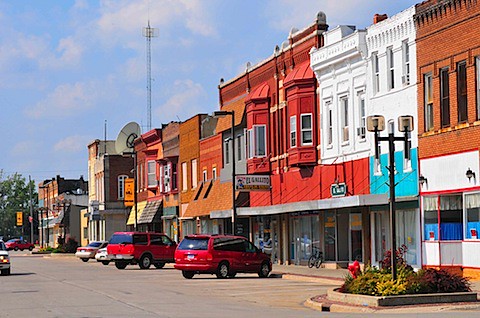
The Sheridan Store: Coming soon!
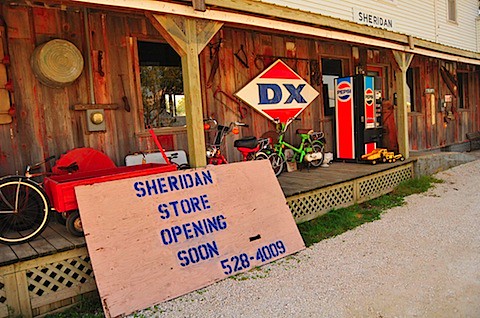
The grand Meskwaki Casino
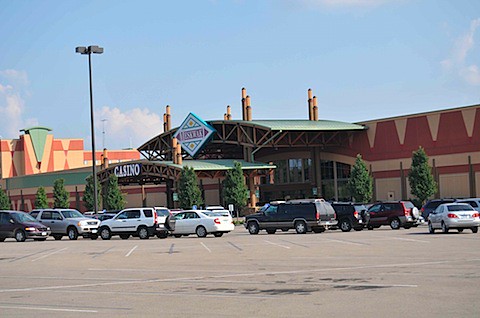
The Cider press, and another young Hinegardner
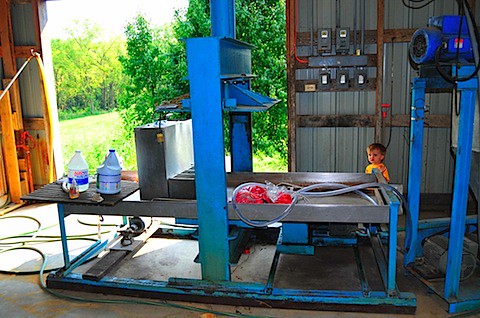
1 comment:
Awesome, Ben. As always, I'm very proud of you.
Uncle Paul
(did I just eleiminate ALL web cred by that signature?)
Post a Comment